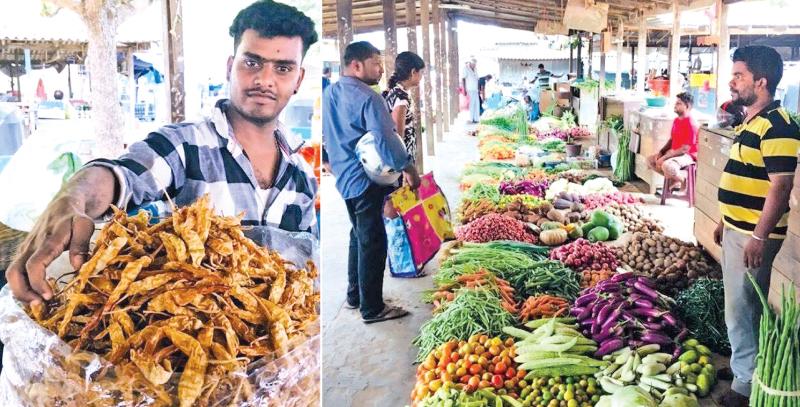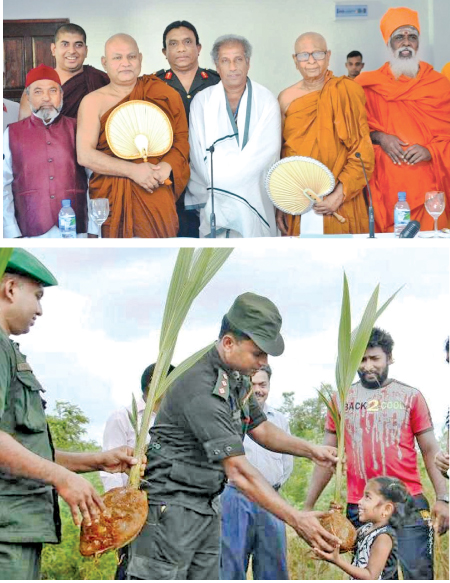
The great Human Rights activist Martin Luther King once opined, “The aftermath of non-violence is a beloved community.” This is what came to my mind when I was in Jaffna this past weekend. The Northern Province was once witness to a dark chapter of hatred and conflict. Thankfully, there is positive change. One must remember that change does not happen overnight. Change is a consistent process, and must be encouraged at every level. Every citizen, irrespective of his ethnicity and religious doctrines has equal rights to life, liberty and the pursuit of happiness. As we walked through the streets of Jaffna, it seemed just like any other major town, except that here most of the business name boards displayed Tamil names and Tamil songs would resonate from certain shops.
As I walked into the market accompanied by Timothy, we were able to see the fresh bountiful produce . Vegetables such as murunga were above average in size, an endorsement to the good soil in the Northern Province. We engaged the vendors in conversation.
 A woman was selling products made from the resilient palmyrah tree. This amazing tree yields its fruits, palms and bark in total sacrifice. The palmyrah pulp is used for various sweets, and even in the production of toddy. Some vendors told us that they would be able to sell their products in Colombo if they had facilities for transport and basic forms of visual advertising. I observed a foreign couple mesmerized by the range of natural products, as globally, people are connecting to organic foods.
A woman was selling products made from the resilient palmyrah tree. This amazing tree yields its fruits, palms and bark in total sacrifice. The palmyrah pulp is used for various sweets, and even in the production of toddy. Some vendors told us that they would be able to sell their products in Colombo if they had facilities for transport and basic forms of visual advertising. I observed a foreign couple mesmerized by the range of natural products, as globally, people are connecting to organic foods.
Palmyrah trees stand like sentinels all over the Province and can be planted in a systematic manner to increase their value as a commercial crop. The vendors selling vegetables told us that they too would like to learn the art of pickling products so that excess harvest can be bottled and sent to Colombo. The market is indeed a meeting point for customers and vendors, both bargaining and engaging in banter. The dried fish shops also displayed some large fish, that one does not encounter in Colombo. It was nice to see the Jetwing Hotel standing tall in the city centre. Many Tamil youth have been employed here, which is a great opportunity for them. Tourism is one area that has not been fully tapped into as the Province has an abundance of cultural and religious heritage sights, supplemented by pristine beaches in areas such as, Karainagar. We consumed a spicy lunch with joy, at the Rolex Hotel.
The Army operating under the command of the Security Force Head Quarters – Jaffna, commonly referred to as SFJ by the Tamil population has made an immense contribution to the citizens of the North. I was able to tour some places with Major Pathirane and Captain W. Abeysinghe.
First among these stops was the farm of almost 180 acres located alongside the cantonment. Here, for the first time, I was able to see rehabilitated ex- combatants working with earnest. I stopped to talk to them. The first was Wijekumar, who is now 36 years. Standing at 6 feet he displays a rough physique. He said “I am happy to be here in this farm. It is a new chapter in my life. In the past I had no choice as I was forcefully recruited to fight”. Wijekumar has a diploma in computer science and can also converse in basic English and Sinhalese. The persons employed here are able to draw a pension on retirement. Wijekumar is able to live with his wife and two children. This happy father hopes to educate his children and has now realized that we are all Sri Lankans.
The other farm worker was a woman, also a mother of two kids. A resident of Killinochchi, Kalaivani, (34) was forced to join the fighting cadre in 2007. By 2009 she willingly surrendered. On her forehead is a deep scar. As I look at her forehead she answers “I had sustained a head injury. If not for this job which pays a salary of almost 40,000 rupees, I would have no hope in life. We were once rejected by our community. Today, due to this job and income we live as a family”. This hardworking mother wants her children to be educated and have a future laden with joy. The farm produces many vegetables.
When the present Army Commander General Mahesh Senenayake was the SF- Jaffna commander he envisaged a lovely project along with Fonterra milk. The company donates milk to pregnant women (some who are former combatants). Today, this project has gained momentum with the vision of the present SFJ Commander General Dharshana Hettiarachchi. The Army has also started another project of giving sewing machines to rehabilitated women combatants- providing them the skill and dignity to live with an income. We visited two such houses in Keerimalai and spoke to the two women. They aspire to stitch curtains and increase their sewing capacity. In addition, the army has also assisted to rebuild damaged schools and dilapidated Hindu kovils, as the kovil is central to every village.
Since 2017 a project was launched to plant 100,000 coconut trees as part of coast conservation. Another remarkable task in building cultural bridges was the Jaffna Food Festival held in December 2017, where the cuisine of the Northern Province was displayed. Scholarships have also been offered to students who excel at school.
During this Vesak weekend we were able to walk around Jaffna town, where the SFJ staff had set up a massive pandal and other lanterns. There were hundreds of visitors from the South of Sri Lanka mingling and taking selfies with the citizens of the North. The crowd was almost 15,000 people.
Religious harmony is key to peace. Jaffna has set the pace. We are now a nation united towards positive change.
